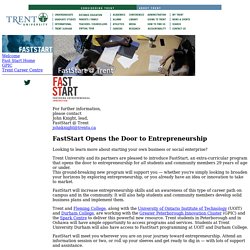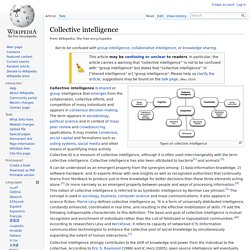

Fast Start. Looking to learn more about starting your own business or social enterprise?

Trent University and its partners are pleased to introduce FastStart, an extra-curricular program that opens the door to entrepreneurship for all students and community members 29 years of age or under. This ground-breaking new program will support you — whether you're simply looking to broaden your horizons by exploring entrepreneurship, or you already have an idea or innovation to take to market. FastStart will increase entrepreneurship skills and an awareness of this type of career path on campus and in the community. It will also help students and community members develop solid business plans and implement them.
Trent and Fleming College, along with the University of Ontario Institute of Technology (UOIT) and Durham College, are working with the Greater Peterborough Innovation Cluster (GPIC) and the Spark Centre to deliver this powerful new resource. Peterborough, Oshawa, Ontario, Canada. RESTART Entrepreneurship. Portia Web. The Portia Strategy Portia's strategy is to help women and men have the same opportunities for engagement and advancement in science, across all science disciplines by: 1) promoting cultures that are collaborative and sensitive to gender issues; 2) ensuring that quality of research and innovation is enhanced by addressing gender issues, where relevant; and 3) showing how new ideas and markets for science knowledge can be created by including women as co-owners and co-solvers of problems facing society.

Our flagship projects include genSET: gender in science and The Gender Summits: Quality Research and Innovation through Equality. Portia was established in 1997 by a group of female scientists working at Imperial College and incorporated as a not-for-profit company in 2001. Dr Elizabeth Pollitzer, one of these scientists, serves as our Managing Director.
We are always happy to explore new partnerships so do contact us if you have an idea. The Board of Directors. Home - Gender Summits. Collective intelligence. Types of collective intelligence Collective intelligence is shared or group intelligence that emerges from the collaboration, collective efforts, and competition of many individuals and appears in consensus decision making.

The term appears in sociobiology, political science and in context of mass peer review and crowdsourcing applications. It may involve consensus, social capital and formalisms such as voting systems, social media and other means of quantifying mass activity. Collective IQ is a measure of collective intelligence, although it is often used interchangeably with the term collective intelligence. Collective intelligence has also been attributed to bacteria[1] and animals.[2] Collective intelligence strongly contributes to the shift of knowledge and power from the individual to the collective.
History[edit] Dimensions[edit] Howard Bloom has discussed mass behavior—collective behavior from the level of quarks to the level of bacterial, plant, animal, and human societies. Foldit. Created by various departments and labs from the University of Washington, Foldit explores the process by which living beings create the primary structure of proteins.

The protein biosynthesis is reasonably well understood, as is the means by which proteins are encoded as DNA. Determining how the primary structure of a protein turns into a functioning three-dimensional structure – how the molecule “folds” – is more difficult; the general process is known, but predicting protein structures is computationally demanding. Foldit is an attempt to apply the human brain’s natural three-dimensional pattern matching abilities to this problem. Current puzzles are based on well-understood proteins; by analyzing the ways in which humans intuitively approach these puzzles in the game, researchers hope to improve the algorithms employed by existing protein-folding software. Price:Free Press:Boing BoingWired Trailer: Review the Game. Innovation Management.
University of Technology. Professor Mike Wright. Summary Professor Mike Wright joined Imperial College Business School as Professor of Entrepreneurship in September 2011.

He is Director of the Centre for Management Buy-out Research, the first centre to be established devoted to the study of private equity and buyouts, which was founded in March 1986 at the Nottingham University Business School. Previously he was Professor of Financial Studies at Nottingham University Business School since 1989.
He has written over 40 books and more than 300 papers in academic and professional journals on management buy-outs, venture capital, habitual entrepreneurs, academic entrepreneurs, and related topics. He served two terms as an editor of Entrepreneurship Theory and Practice (1994-99), was a joint editor of the Journal of Management Studies until 2009 and is editor elect of the Strategic Entrepreneurship Journal. Publications More Publications. Fabio Casati (University of Trento) Audit of Learning Tools. Mobile & Digital E-Learning Toolkit.